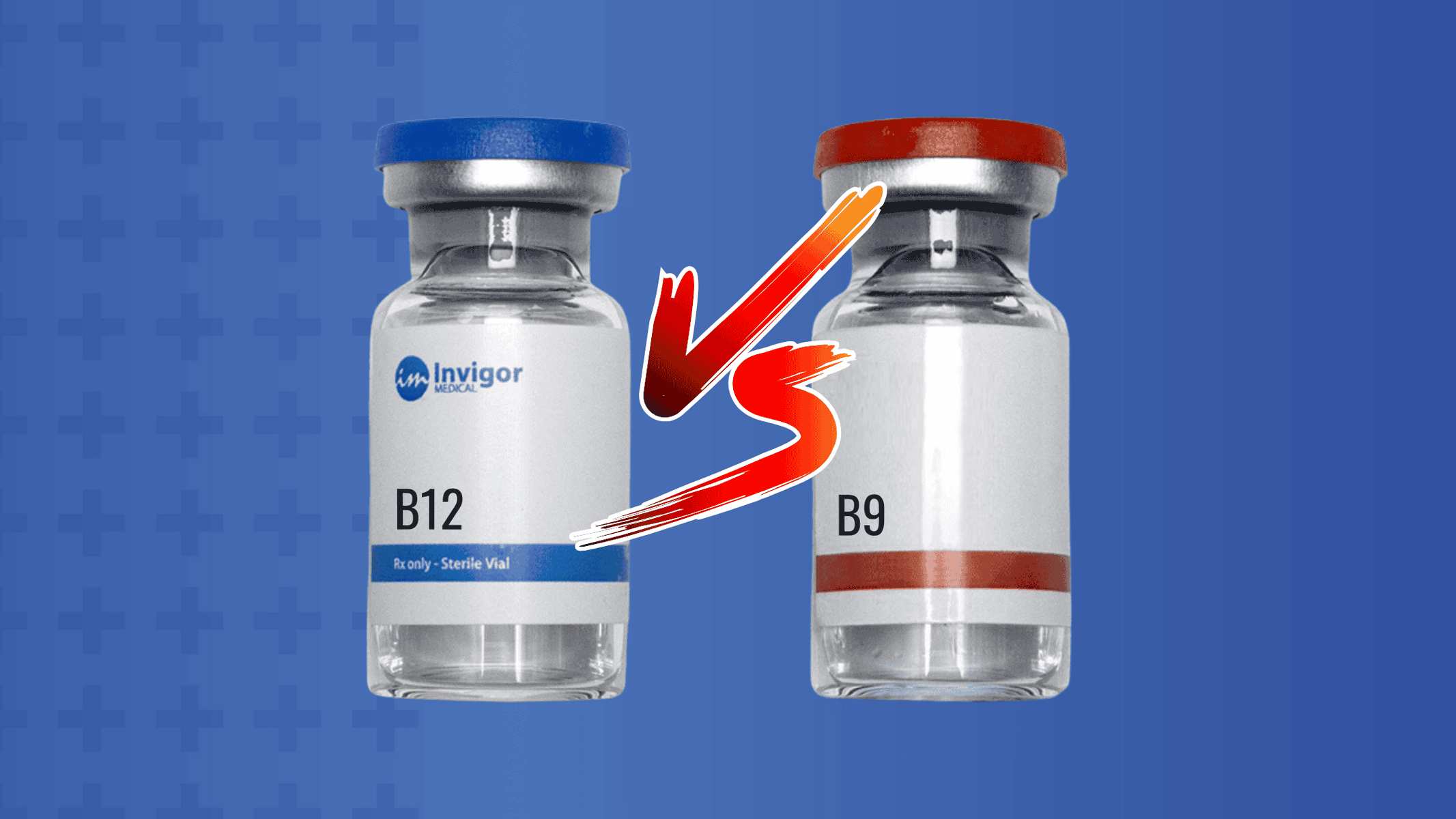Vitamin B12 vs Vitamin B9—these essential vitamins might both promise to enhance energy, support weight management, and tackle age-related symptoms, but how do you know which one is right for you? From boosting your energy levels to supporting overall health, both Vitamin B12 and B9 hold critical roles in your wellbeing. This article serves as your guide to understanding their differences in safety, effectiveness, and dosing. Ready to dive deeper into the comparison and make an informed decision? Let’s explore together.

Targeted Benefits of Vitamin B12 and B9: Addressing Specific Health Concerns
What it Treats
- Supports energy production by aiding red blood cell formation.
- Manages symptoms of anemia and fatigue.
- Enhances nerve cell health and function.
- Improves cognitive performance and mental clarity.
- Assists in maintaining cardiovascular health.
- Supports fetal development during pregnancy, reducing neural tube defects.
- Manages symptoms of certain types of anemia.
- Improves mood by regulating neurotransmitters.
- Assists in DNA synthesis and repair.
- Supports healthy cell division and growth.
How it Works
Main Benefits
- Reduces fatigue by supporting energy metabolism and red blood cell production.
- Treats pernicious anemia by facilitating proper absorption and utilization of nutrients.
- Alleviates cognitive decline through nerve health maintenance and brain function support.
- Controls homocysteine levels, promoting cardiovascular health.
- Enhances nerve health, reducing numbness and nerve damage symptoms.
- Supports fetal development, preventing neural tube defects during pregnancy.
- Alleviates certain types of anemia through blood cell synthesis and repair.
- Improves mood and mental health by regulating neurotransmitter function.
- Aids in DNA synthesis, promoting healthy cell division and growth.
- Supports the body’s ability to repair and create new tissues, contributing to overall development.
Administration, Dosage, and Optimal Use of Vitamin B12 and B9
Dosing Requirements
- Method of Administration: Available as oral tablets, sublingual, injections, or nasal sprays.
- Typical Dosage: Typically ranges from 500 mcg to 5,000 mcg daily, depending on the form and individual needs.
- Optimal Timing: Best taken in the morning, with or without food, to maximize energy benefits throughout the day.
- Safe Combinations: Often combined with Vitamin D, Omega-3, and L-Arginine supplements for comprehensive health support.
- Method of Administration: Commonly administered as oral tablets or as part of a multivitamin.
- Typical Dosage: Standard dosage is around 400 mcg daily, with adjustments during pregnancy or specific health conditions.
- Optimal Timing: Can be taken at any time of the day, preferably with food to enhance absorption.
- Safe Combinations: Pairs well with iron and vitamin C supplements to enhance absorption and efficacy.
Effect Duration
- Onset Time: Vitamin B12 injections can begin working within 48 hours, providing a quick boost in energy.
- Duration of Effects: The effects of Vitamin B12 injections can last for about one week, while oral supplements may take a bit longer to sustain energy levels.
- Immediate vs. Cumulative: Vitamin B12 offers both immediate boosts in energy and alertness, with cumulative effects on nerve health over time.
- Noticeable Results: Most individuals begin to notice improvements in symptoms such as fatigue within a few days to a week after starting supplementation.
- Onset Time: Folate typically starts working within a few days to support bodily functions, depending on current health status and deficiency levels.
- Duration of Effects: Its effects are more subtle but continue to build cumulatively with regular daily intake.
- Immediate vs. Cumulative: Folate primarily provides cumulative benefits, supporting long-term health objectives like cell division and fetal development.
- Noticeable Results: Significant benefits, such as mood improvement or anemia correction, may take several weeks to become apparent.
Understanding Safety and Side Effects of Vitamin B12 and B9
Side Effects and Safety
Common Side Effects:
- Mild headache
- Upset stomach
- Dizziness
Safety Summary: Vitamin B12 is generally considered safe for most people, with side effects being mild and temporary. Adverse reactions are rare, but individuals should seek medical attention if they experience severe allergic reactions, such as rash or difficulty breathing.
Interaction: There are minimal drug interactions, though excessive alcohol consumption can affect absorption.
Common Side Effects:
- Nausea
- Bloating
- Bitter taste in the mouth
Safety Summary: Folate is generally safe when taken as directed, with most side effects being mild and temporary. Seek medical attention if experiencing severe skin rash or difficulty breathing, as these may indicate an allergic reaction.
Interaction: Folate may interact with certain medications, such as methotrexate or antiepileptic drugs, affecting their efficacy.
Identifying the Ideal Candidates for Vitamin B12 and B9 Supplementation
Ideal Candidate
Individuals seeking increased energy and neurological support can significantly benefit from Vitamin B12 supplementation.
- Adults over 50 who may experience reduced absorption of B12 from dietary sources.
- Individuals with anemia, particularly pernicious anemia, requiring improved red blood cell production.
- Those experiencing fatigue and cognitive decline, looking to enhance mental clarity and energy levels.
Folate is ideal for those supporting cellular growth and development, and it is especially beneficial for pregnant individuals.
- Women of childbearing age and during pregnancy to prevent neural tube defects in developing fetuses.
- Individuals experiencing anemia related to folate deficiency, seeking improved red blood cell formation.
- People undergoing high cellular turnover, such as adolescents or those recovering from certain health conditions, for healthy cell division and repair.
Conclusion: Vitamin B12 as the Preferred Choice for Enhanced Energy and Health
Vitamin B12 stands out thanks to its quick energy-boosting effects and support for neurological health. While Vitamin B9 (Folate) offers significant benefits in cellular growth and prenatal health, Vitamin B12’s role in enhancing cognitive function and reducing fatigue provides a substantial advantage. Given its benefits for those over 50 and individuals facing anemia, Vitamin B12 emerges as the preferred choice for most patients seeking improved energy and well-being.

